This page contains affiliate links. Learn more.

Our Verdict (Best For)
The Brita Everyday Elite is our #1 budget pick for a water filter pitcher thanks to its very low upfront and long-term costs. It has a high count of NSF/ANSI-certified contaminants, though mainly for easier-to-remove organics. Setup is simple, everyday use is smooth, it filters very fast (even on demand), and produces better-tasting, odorless water. It’s comfortable to hold, pours cleanly, fits well in the fridge, and filter replacements are easy with the filter life indicator tracking refills. Cons: While contaminant reduction in our 2025 lab testing was solid, 2024 left room for improvement. The smaller feed capacity means more refills (let it fully filter before pouring, or you’ll get unfiltered water leakage). Finally, its flip-top lid doesn’t seem very sturdy and there’s only a short 90-day warranty.
The Brita Everyday Elite, some people also call it the Brita Large or Brita 10-Cup, is a drinking water filter that can purify both tap water and properly disinfected well water.
As usual, we’ve tested the pitcher with our own hands:
- Hands-on experience: We assembled, primed, used, and maintained it.
- Filtration effectiveness: Across 2 independent test rounds, we sent unfiltered and filtered tap water samples to professional laboratories for analysis to determine real-world contaminant reduction. Each round used a different pitcher, water supply, and lab. We also reviewed NSF/ANSI certifications and other available test data.
- More testing: We conducted taste and odor evaluations as well as filtration speed tests.
- All other product aspects: We considered initial and long-term costs, warranties, additional features, frequent customer complaints, and more.
To learn more about our testing procedure check our editorial guidelines.
Contents

Final Rating: /5.00
FiltrationFiltration score combines our lab results and taste testing with NSF/ANSI certifications and 3rd-party contaminant reduction data.: /5.00
Usability: /5.00
CostsCost scores reflect overall value for money rather than price alone.: /5.00
| Type: | Water Filter Pitcher |
| PriceNo short-term sales. (Sep 16, 2025): | $40.99 |
| Yearly CostEstimate is based on rated/claimed filter life and 300 gallons annual water consumption. No short-term sales. (Sep 16, 2025): | ~$40-45 |
Final Rating: /5.00
What We Like Most
- Achieved solid results in our 2025 lab testing.
- Filtered water had a much better taste and no odor (2025 test).
- Highest count of NSF/ANSI-certified contaminants of all tested pitchers but mostly limited to “easier-to-remove” organics.
- Made from BPA-free materials and available in 3 colors.
- Setup is easy with clear step-by-step illustrations, plus a YouTube tutorial for quick reference.
- Fast enough for daily use and on-demand filtering (1 cup in under 45 seconds).
- Comfortable to hold + pours smoothly without spilling, even when pouring fast.
- Smaller feed capacity means more frequent refills, but it’s still large enough to fill a 40-oz bottle with 1 refill.
- Easy one-handed refilling using flip-top lid.
- Fits comfortably on fridge shelves and in doors.
- Filters are easy to replace. Filter life indicator tracks refills.
- Well below-average upfront and annual filter replacement costs.
What We Don’t Like
- Achieved mediocre results in our 2024 lab testing.
- Filtered water was odor-free but had some remaining taste (2024 test).
- Flip-top lid doesn’t seem very sturdy.
- Unfiltered water leaked through a gap near the spout when pouring which led to mixing with filtered water.
- Short 90-day warranty.
- Third-party customer complaints include cracked plastic, filter indicator light failures, leaks, and design flaws.
How the Brita Everyday Elite Compares to…
13 Other Water Filter Pitchers
In this video, Sara explains why the Brita Everyday Elite became our #1 budget filter pitcher.
Please note: Our full guide on the best water filter pitchers is available here.
Video Chapters + Comparison Sheet
- Link to Comparison Sheet
- 00:00 – Intro
- 00:33 – What’s New
- 01:10 – Our 14 Pitchers
- 03:00 – Top Pick: Clearly Filtered
- 12:21 – Runner-Up: Culligan (and ZeroWater)
- 23:20 – For Usability: Epic Pure
- 26:22 – Budget Pick: Brita Everyday Elite
- 28:07 – Hard Water: Waterdrop Chubby
- 28:57 – Bacteria & Parasites: LifeStraw
- 30:16 – Seychelle RAD & Aquagear
- 32:03 – LARQ Pitcher PureVis
- 33:35 – PUR Plus 11-Cup
- 35:09 – Summary
Full Analysis of the Brita Everyday Elite
Filtration: /5.00
The Brita Everyday Elite water filter pitcher scored 3.33/5.00 for filtration. How? It achieved mediocre results in our 2024 lab testing and solid results in our 2025 lab testing. In our 2025 test, the filtered water had a much improved taste compared to our tap water (though it was not perfect), while we noted some remaining taste in the 2024 test (no odor was noted either year). Impressively, this pitcher has the highest count of NSF/ANSI certifications for contaminant reduction of the water filter pitchers we tested so far; however, it’s limited regarding contaminant types, mostly covering “easier-to-remove” organics.
1. Lab Results: /5.00 (2025) & /5.00 (2024)
Remember that our before vs after lab comparison is not an exact science. It’s informational and subject to variability, inaccuracies, and interferences caused by natural fluctuations in water quality, accidental contamination, human error, instrumentation issues, and more. Furthermore, our lab-testing is limited to those contaminants present in our water supplies and at their respective concentrations. As such, it can only give us a general idea for how effective a certain water treatment product might be.
In our 2024 and 2025 lab tests comparing an unfiltered and a filtered tap water sample, the Brita Everyday Elite could remove 7 undesirable impurities and contaminants to below the minimum detection level (so essentially to 100%): chlorine, bromodichloromethane*, bromoform, dibromochloromethane*, chloroform*, iron, and manganese.
The following substances remained in our water:
- Copper showed complete removal in 2024 but this decreased to 88% reduction in 2025, which is still high.
- Barium was completely removed in 2024 and reduced by a very high 95% in 2025.
- Boron was reduced by 25% in 2024 and 22% in 2025, which is poor.
- Lithium was reduced by 0% in 2024 (not present in 2025). Although this seems like a particularly bad result at first glance, lithium was already at the lowest detectable level (0.01 ppm) in the unfiltered sample. Due to a limitation of the 2024 analytical method (the lab reported lithium only in 0.01 ppm increments), reduction could only be calculated as either 0% or 100%.
- Strontium was reduced by a moderate 56% in 2024 and by a comparable 52% in 2025.
- Nitrate was reduced by a poor 21% in 2024 and a moderate 46% in 2025.
- Fluoride increased by 15% in 2024 which could be natural fluctuations. That said, our 2024 fluoride test method is known to be susceptible to alkalinity interference, with higher alkalinity producing artificially elevated fluoride readings. Because the filtered water showed increased alkalinity, that could explain the apparent fluoride increase. Either way, we’re confident the Brita Everyday Elite doesn’t leach fluoride. After all, we don’t know of any filter media containing fluoride. At the same time, we don’t think the Brita is effective at fluoride reduction either. This was confirmed in our 2025 testing, where we used a different lab method to measure fluoride (we consider this method to be much more reliable compared to 2024). Here, the pitcher reduced fluoride by a very poor 11%.
- Uranium was reduced by a moderate 57% in 2024 (not present in 2025).
Finally, limescale/hardness decreased by 24% in 2024 and by 9% in 2025, so the Brita pitcher may not be suited to protect your kettle and/or coffee maker from buildup.
Aside from contaminant reduction, we found 2 substances in our 2024 filtered water that were not present in the unfiltered water, suggesting potential leaching: aluminum (0.01 ppm) and silver (0.01 ppm). Silver also showed up in our 2025 filtered water (0.0082 ppm), and a third contaminant, titanium, was also detected (0.0092 ppm).
Fortunately, aluminum was present well below the public health goal of 0.6 ppm per the OEHHA. Likewise, silver was found at the lowest level detectable in 2024 and 10 times lower than the strictest silver heath guideline at 0.1 ppm; it was even lower in 2025 (note: Brita discloses the use of silver in the filter media to support hygiene of the filter). We couldn’t find any health guideline for titanium in drinking water; the lack of a guideline suggests it shouldn’t be a health concern.
*In our 2025 lab testing, we artificially spiked our tap water with fluoride and nitrate because our new water supply contains neither. The nitrate solution, however, unintentionally contained chloroform, resulting in a test concentration of 1,670 ppm – far above realistic tap water levels (100 ppm is already considered high). Despite this extremely elevated concentration, the Brita removed chloroform and the 2 other disinfection byproducts to 96% or higher. When conducting a re-test for VOC reduction at a normal chloroform level (34.7 ppm), the Brita achieved 100% removal of all DBPs. For our lab results score, whichever DBP reduction result was higher (original or re-test) was used.
Lab Results Charts
| Potentially Harmful | Aesthetic Issues | Feed Water Level | Filtered Water Level | Reduction Rate | |
| Water Disinfectants | |||||
| Chlorine (mg/L) | ✖ | ✖ | ~2 | 0 | 100% |
| Disinfection Byproducts (Ultra-High Chloroform) | |||||
| Bromodichloromethane (µg/L) | ✖ | 19.9 | 0.7 | 96% | |
| Dibromochloromethane (µg/L) | ✖ | 5.81 | 0 | 100% | |
| Chloroform (µg/L) | ✖ | 1,670 | 38.5 | 98% | |
| Disinfection Byproducts (VOCs Re-Test) | |||||
| Bromodichloromethane (µg/L) | ✖ | 15.5 | 0 | 100% | |
| Dibromochloromethane (µg/L) | ✖ | 4.24 | 0 | 100% | |
| Chloroform (µg/L) | ✖ | 34.7 | 0 | 100% | |
| Metals | |||||
| Copper (mg/L) | ✖ | ✖ | 0.0136 | 0.0017 | 88% |
| Iron (mg/L) | ✖ | 0.0763 | 0 | 100% | |
| Manganese (mg/L) | ✖ | ✖ | 0.0036 | 0 | 100% |
| Barium (mg/L) | ✖ | 0.0407 | 0.002 | 95% | |
| Boron (mg/L) | ✖ | 0.0153 | 0.012 | 22% | |
| Strontium (mg/L) | ✖ | 0.112 | 0.0541 | 52% | |
| Salts | |||||
| Nitrate (N) (mg/L) | ✖ | 2.74 | 1.47 | 46% | |
| Fluoride (mg/L) | ✖ | 0.925 | 0.824 | 11% | |
| Aesthetic Parameters | |||||
| Hardness (mg/L) | ✖ | 59.89 | 54.67 | 9% | |
| Other Parameters | |||||
| pH | 7.8 | 7.7 | |||
| Impurities NOT Detected in Unfiltered Tap Water Sample | |||||
| Silver (mg/L) | ✖ | 0 | 0.0082 | ||
| Titanium (mg/L) | 0 | 0.0092 | |||
| Lab Reports (Ultra-High Chloroform): Filtered Water Report, Unfiltered Water Report | |||||
| Lab Reports (VOCs Re-Test): Filtered Water Report, Unfiltered Water Report | |||||
| Chlorine Self Test Photos: Filtered Water, Unfiltered Water | |||||
| Explanation: | |||||
| Full Removal | |||||
| Considerable Reduction | |||||
| Concentration More Than Double of Unfiltered Water Sample | |||||
| Potential Leaching Reached or Exceeded the Strictest Public Health Guideline We Could Find | |||||
| Potentially Harmful | Aesthetic Issues | Feed Water Level | Filtered Water Level | Reduction Rate | |
| Water Disinfectants | |||||
| Chlorine (mg/L) | ✖ | ✖ | 0.2 | 0 | 100% |
| Disinfection Byproducts | |||||
| Bromodichloromethane (µg/L) | ✖ | 0.58 | 0 | 100% | |
| Bromoform (µg/L) | ✖ | 0.75 | 0 | 100% | |
| Dibromochloromethane (µg/L) | ✖ | 0.94 | 0 | 100% | |
| Metals | |||||
| Copper (mg/L) | ✖ | ✖ | 0.01 | 0 | 100% |
| Barium (mg/L) | ✖ | 0.01 | 0 | 100% | |
| Boron (mg/L) | ✖ | 0.04 | 0.03 | 25% | |
| Lithium (mg/L) | ✖ | 0.01 | 0.01 | 0% | |
| Strontium (mg/L) | ✖ | 0.18 | 0.08 | 56% | |
| Salts | |||||
| Nitrate (N) (mg/L) | ✖ | 1.65 | 1.31 | 21% | |
| Fluoride (mg/L) (Flawed?) | ✖ | 0.46 | 0.53 | 15% Increase | |
| Other | |||||
| Uranium (µg/L) | ✖ | 7 | 3 | 57% | |
| Aesthetic Parameters | |||||
| Hardness (mg/L) | ✖ | 111.9 | 85.4 | 24% | |
| Other Parameters | |||||
| Alkalinity (mg/L) | 140 | 145 | 4% Increase | ||
| pH | 7.77 | 7.84 | |||
| Impurities NOT Detected in Unfiltered Tap Water Sample | |||||
| Aluminum (mg/L) | ✖ | ✖ | 0 | 0.01 | |
| Silver (mg/L) | ✖ | 0 | 0.01 | ||
| Lab Reports: Filtered Water Report, Unfiltered Water Report | |||||
| Explanation: | |||||
| Full Removal | |||||
| Considerable Reduction | |||||
| Concentration More Than Double of Unfiltered Water Sample | |||||
| Potential Leaching Reached or Exceeded the Strictest Public Health Guideline We Could Find | |||||
2. NSF/ANSI Certifications and Other Test Data
The Brita Everyday Elite pitcher is certified for the reduction of 33 contaminants by the WQA against NSF/ANSI standards 42, 53, and 401 and by the IAPMO against NSF/ANSI standard 53. These certifications include reduction of chlorine (97.40%), taste and odor, many “easier-to-remove” organics and a few heavy metals. Other reported reduction rates include lead (99.50-99.60%), mercury (95.50-95.90%), cadmium (96.90-99.20%), asbestos (>99.00%), a number of emerging compounds including several pharmaceuticals, pesticides, herbicides, microplastics and industrial chemicals (93.00-99.00%+), PFOA/PFOS (98.10%) and several VOCs (91.20-99.00%). Reduction rates are per the official performance data sheet.
3. Filtration Process
The Brita Everyday Elite uses activated carbon and absorbents in a fibrous matrix, lined with silver. Activated carbon removes things like bad tastes and odors, chlorine/chloramine, disinfection byproducts and other organics, as well as certain metals. We interpret “absorbents” as ion exchange resin used to target dissolved, unwanted ions in the water. The fibrous matrix might act like a sieve, allowing for mechanical filtration of undissolved particulates. Silver is added to support the hygiene of the filter.
4. Taste and Odor Tests
In our 2024 test, the filtered water was odorless but had some remaining taste. In our 2025 test, the filtered water was odorless as well, and the taste was much improved compared to our tap water, though it was not perfect.

Usability: /5.00
The Brita Everyday Elite pitcher achieved a usability score of 4.05/5.00, based on its performance in the following categories:
- Initial system assembly including filter priming (1.00/1.00)
- Day-to-day use (2.25/3.10)
- Filter replacements (0.80/0.90)
1. Initial Setup: /1.00
Assembling the Brita pitcher is easy. In addition to clear, illustrated directions, a helpful tutorial video is available on YouTube.
Here’s a quick overview of the setup process:
- Hand-wash the pitcher, lid and reservoir; rinse well.
- Remove lid and insert filter below line to seal.
- Press firmly to ensure the filter is secure.
- Turn lid over to access the filter indicator reset panel. Push the button below the blue filter. Hold for at least 5 seconds to start; light will flash 3x to confirm.
- Fill the reservoir with cold tap water to the max-fill line. Pour out the first 3 fills of water or use to water plants.
- Now your pitcher is ready to use.
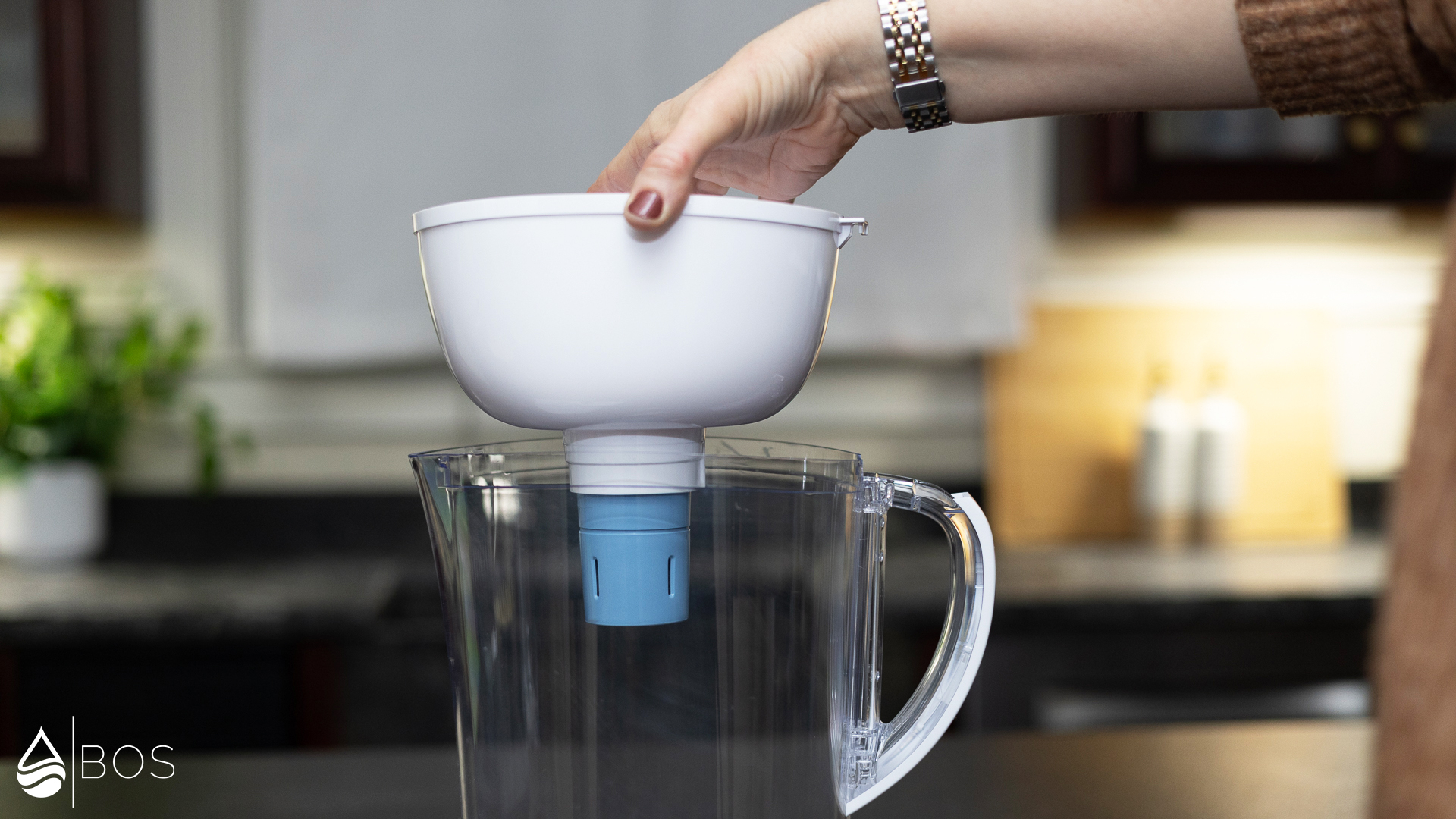
2. Day-to-Day Use: /3.10
2.1 Speed & Water Capacity: /1.20
The Brita pitcher is a reasonable choice for daily use. While its filtered reservoir (11.5-cup capacity) is ample, it has a smaller feed (5-cup), so it can store plenty of water but requires more daily refills to do so – we estimate 6-7 refills for the average-sized US and US family households. This means you will have to make more frequent trips to the tap, unlike with models that have a larger feed (or better-balanced feed + filtered reservoirs), which do not need to be topped off as often.
That said, the Brita pitcher filters fast enough to meet the daily water needs of the average-sized US households, and it can handle thirst bursts. It even filters on-demand, providing 1 cup in under 45 seconds. In our 2025 filtration speed test, the pitcher could filter 4 cups in a quick 2:38 min, consistent with our 2024 test result of 2:30 min.
Finally, the pitcher fits both on the shelves and in the door of a standard fridge (dimensions: 6″x10.4″x10.4″), and thanks to the adequate feed and filtered capacities, you can just fill a large 40-oz bottle with a single refill.
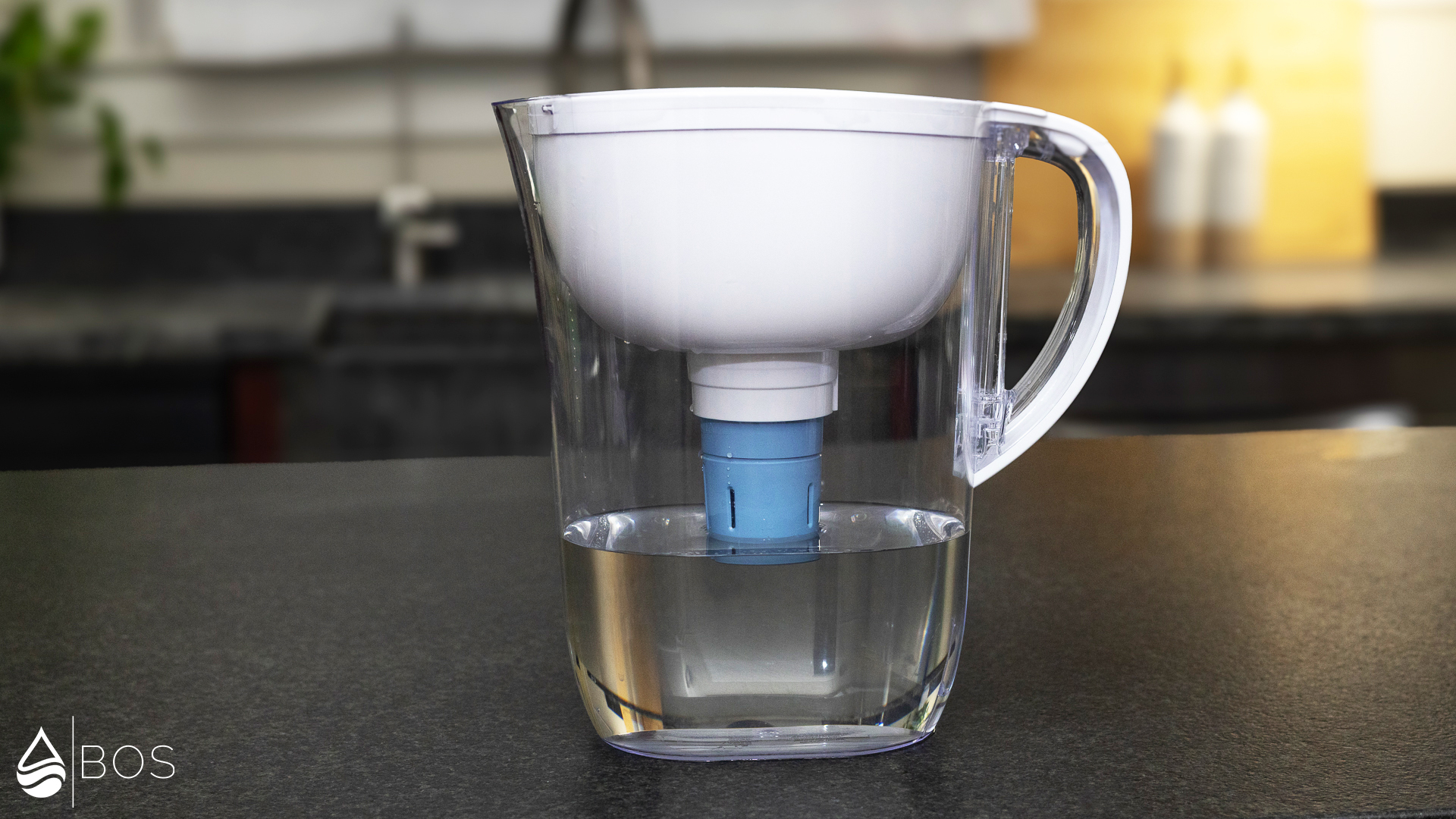
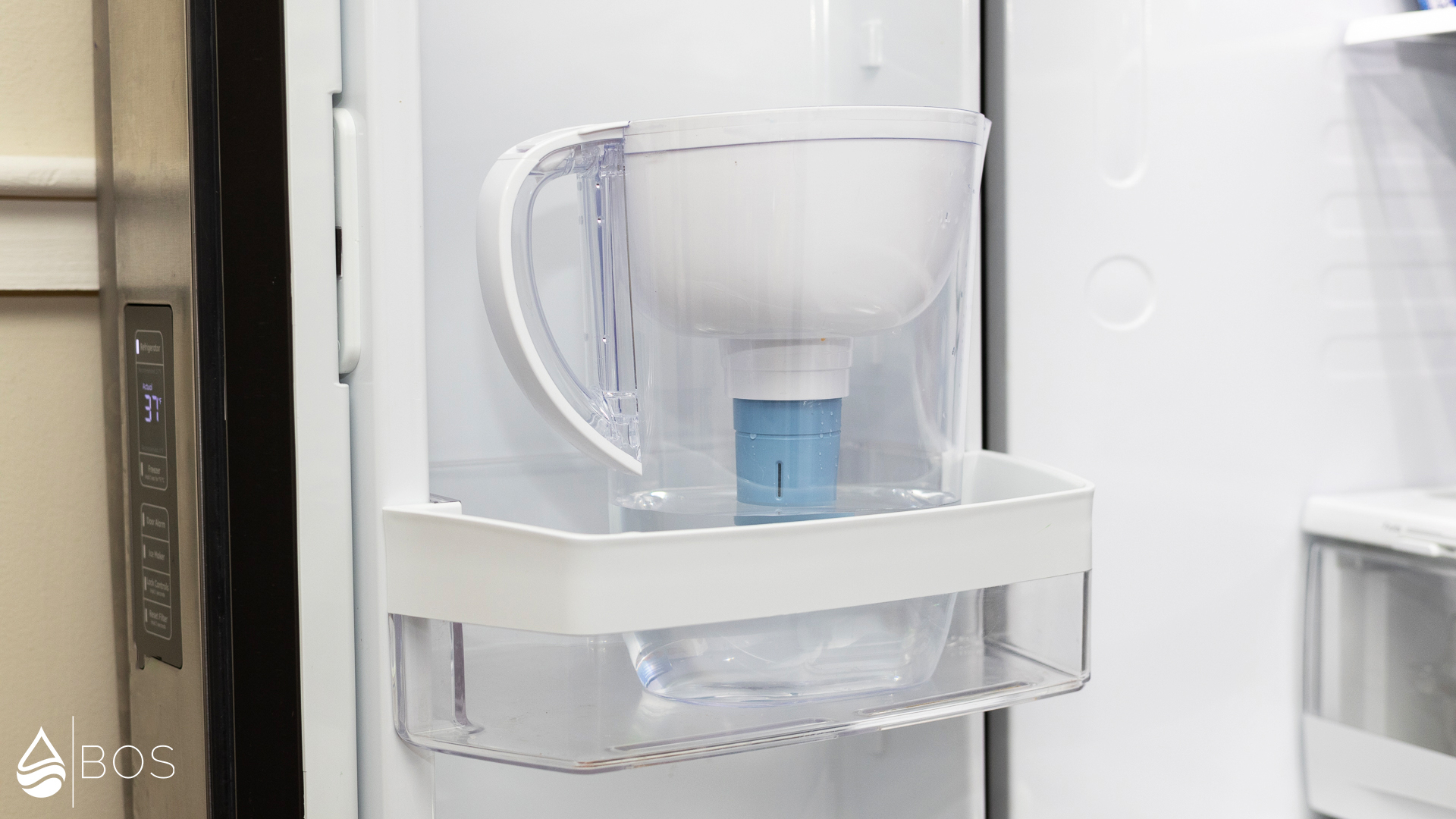
2.2 Handling & Pouring: /1.15
The Brita pitcher’s handle provides a very comfortable grip and allows for smooth pouring without spills, even when pouring quickly. However, in our test unfiltered water leaked through a gap near the spout, mixing with filtered water while pouring. To prevent this, the pitcher must be allowed to fully filter before pouring.
Its weight including the wet filter cartridge is relatively light compared to the other pitchers we have tested, coming in at 1 lb 9.03 oz. While handling is made easier with a lighter pitcher, less weight may indicate flimsier construction (e.g., thinner plastic) and/or less filter media which is not ideal for optimal filtration performance.

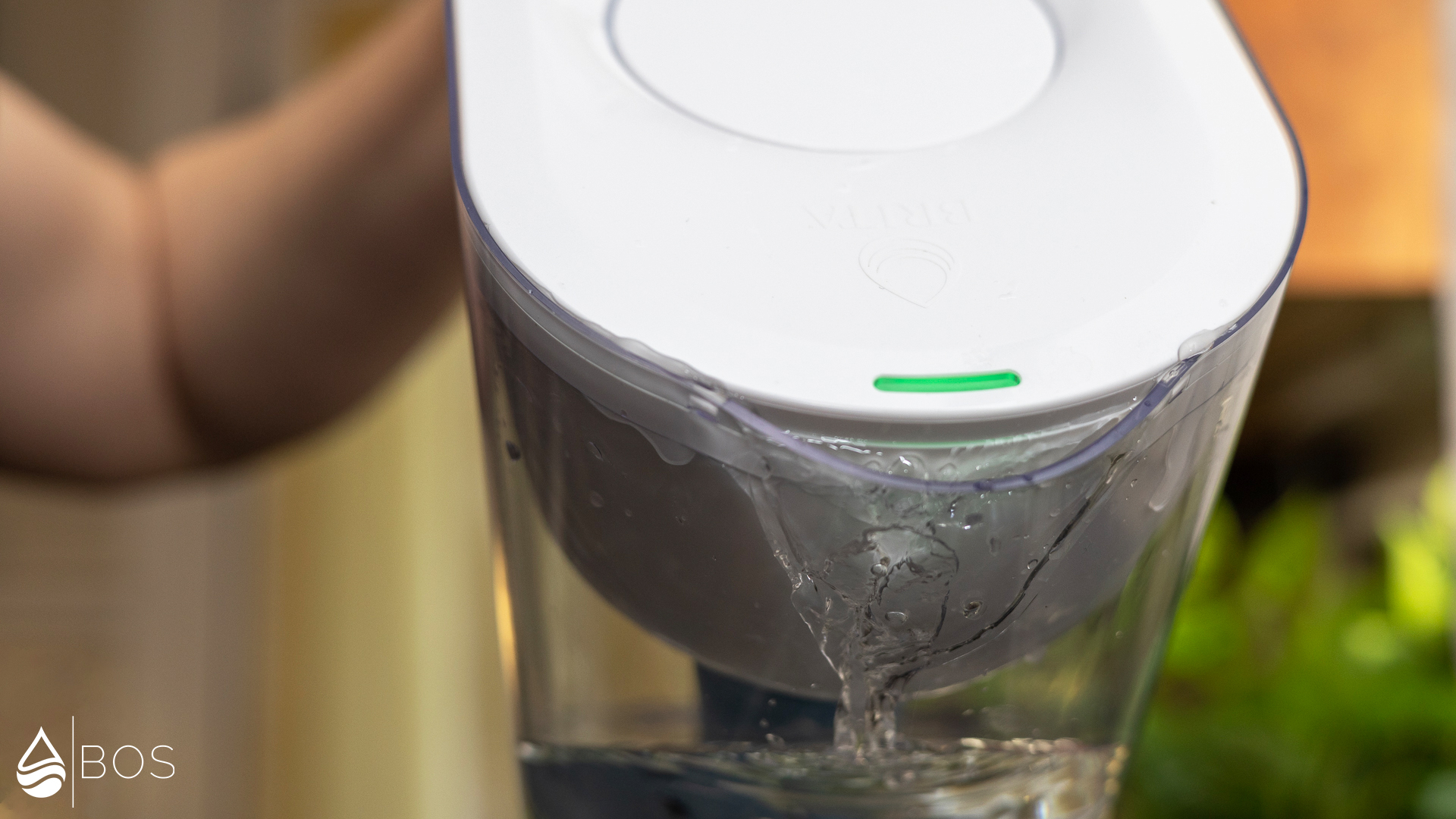
2.3 Refilling: /0.75
The Brita pitcher is easy to refill with one hand thanks to its flip-top lid that opens by pressing a button located in a natural and convenient place near the top of the handle. That said, we foresee the flip-top lid possibly breaking over time if not handled with care due to its lightweight construction.
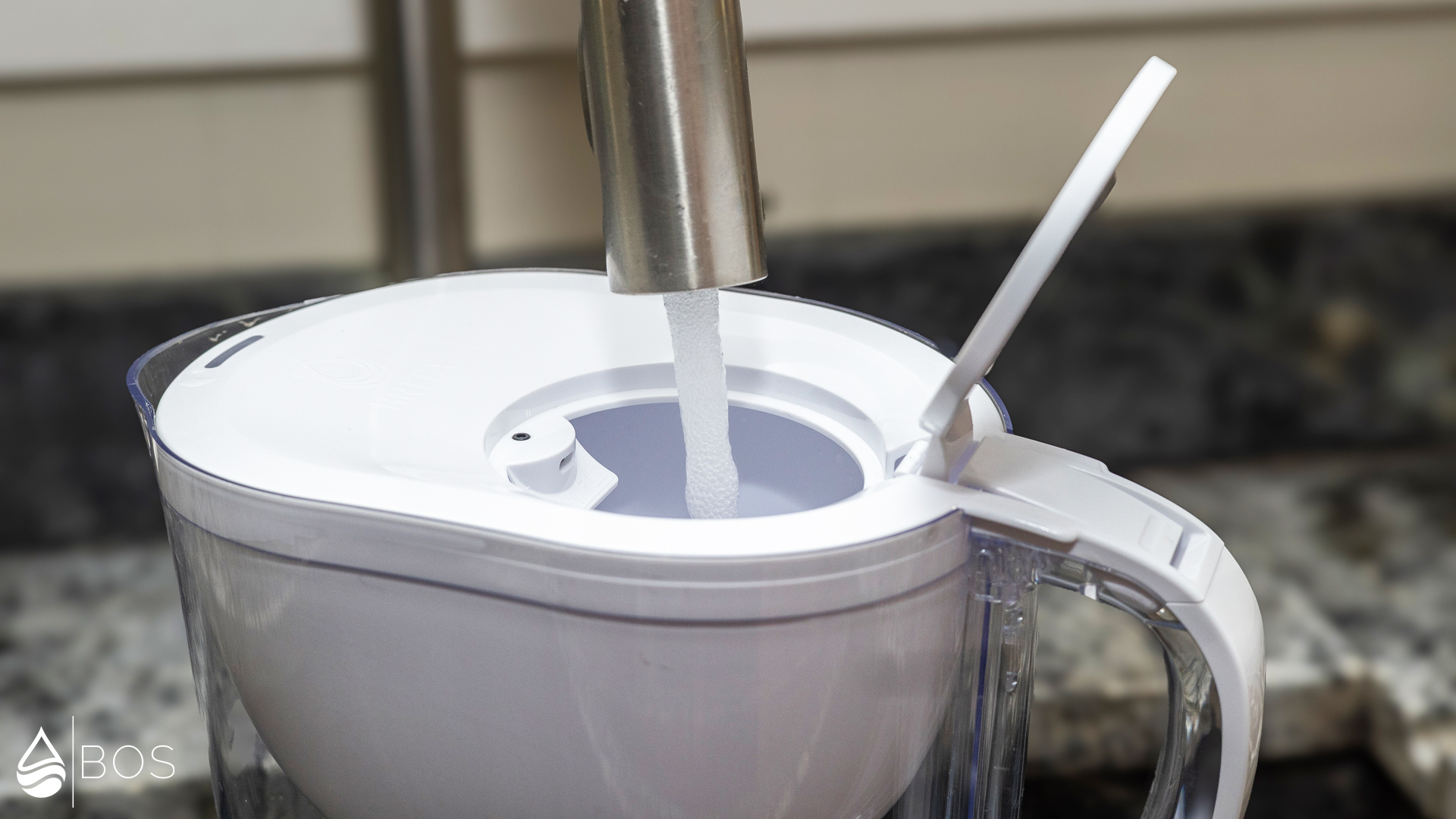
3. Filter Replacements: /0.90
Filter replacements are very easy. Also, the built-in filter replacement indicator in the lid tracks actual water usage by monitoring your refills rather than elapsed time. Rated filter life is 120 gallons. Assuming 300 gallons of yearly water consumption for the average household, we estimate that you will only have to change the filter 2.5x annually.
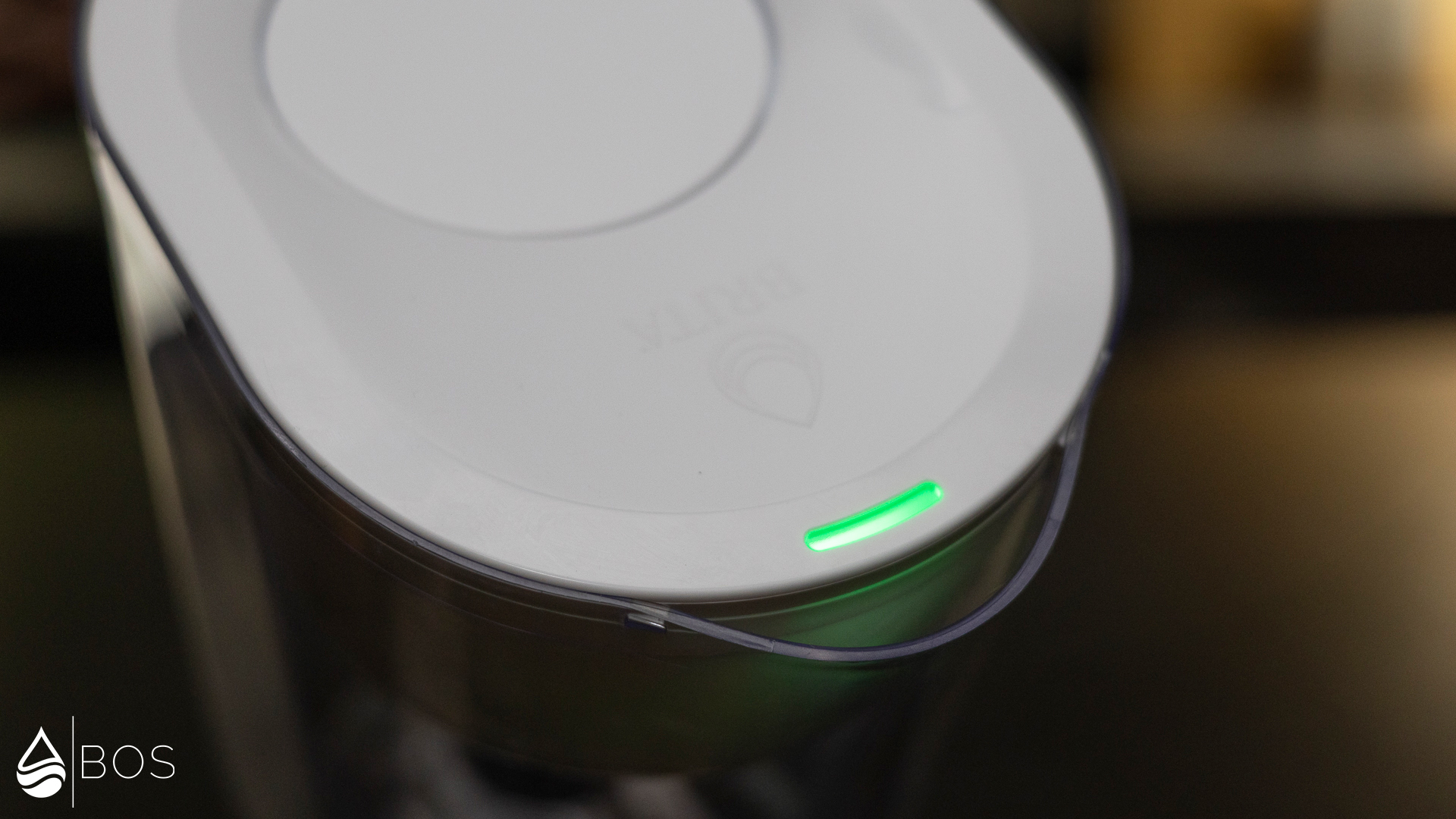
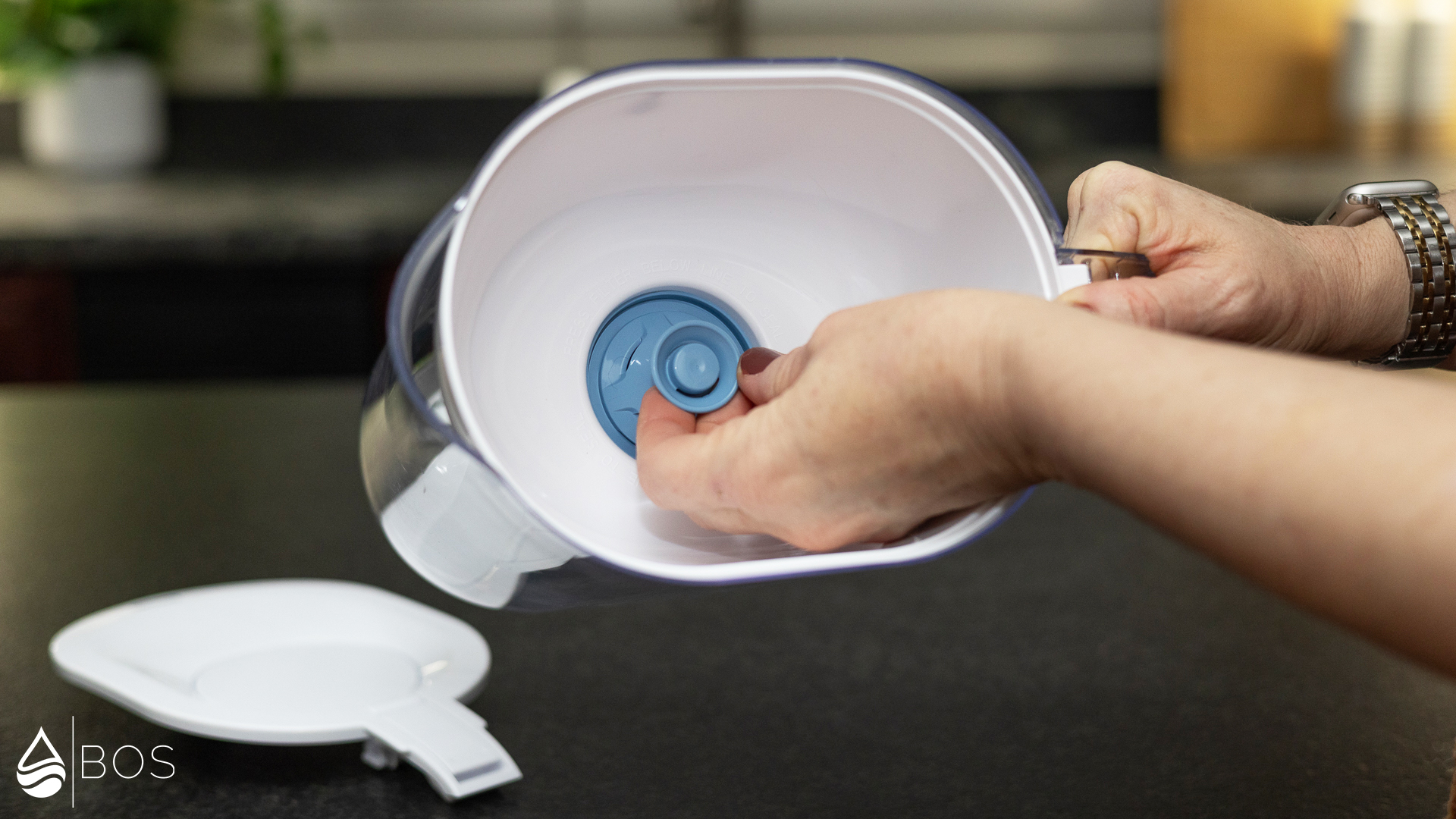
Support BOS Water’s Mission!
Every coffee helps us test more products and bring you unbiased results!
Costs: /5.00
Based on value for money, the Brita Everyday Elite achieved a cost score of 5.00 out of 5.00, indicating it is relatively inexpensive for what it offers compared to competing pitchers (a score of 4.00 represents average value). Notably, both its upfront price and annual filter replacement cost are well below average compared to the other pitchers we tested.
1. Upfront Price
As of September 16, 2025, the Brita is priced at $40.99 which is well below the $58.53 average across all the water filter pitchers we tested.
2. Long-Term Expenses for Filter Replacements
Based on 300 gallons consumption and a 120-gallon filter life, we estimate $40-45 in annual filter replacement costs, which is well below the $120.13 average across all the water filter pitchers we tested.
3. Product Warranty
The system is covered by a short 90-day warranty.
4. Other Cost Factors
- This pitcher comes with a filter life indicator which tracks actual water usage by monitoring your refills (rather than elapsed time).
Additional
1. Looks
This pitcher is available in 3 colors.
2. BPA-Free Materials
The Brita pitcher is made from BPA-free materials.
3. Frequent Customer Complaints
We read about issues with cracked plastic, leaks, filter indicator light failures, and other design flaws.
We did not experience these issues firsthand. Except, we found that the pitcher must be allowed to fully finish filtering before pouring; otherwise, unfiltered water can leak through a gap near the spout and mix with the filtered water during pouring.
Bottom Line: Our #1 Budget Pitcher (/5.00)
Filtration weighted at 60%, and usability and cost at 20% each, the Brita Everyday Elite scored a final rating of 3.81 out of 5.00.
It’s our top pick for a budget-friendly water filter pitcher, as its upfront and maintenance costs are both well-below average. It’s also easy to set up and maintain, pours well and filters fast enough to keep up with your household’s daily water demands (though its smaller feed capacity necessitates more frequent refills). However, its filtration performance was less impressive, as it struggled to fully remove several contaminants in our lab tests in both years. While it has the highest count of NSF/ANSI certifications for contaminant reduction (33), they are mostly for easier-to-remove organics. With its affordability comes lightweight construction and a short 90-day warranty, so its longevity may be more limited.
Further Reading



